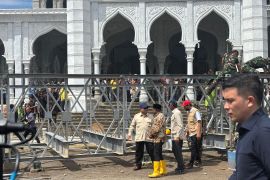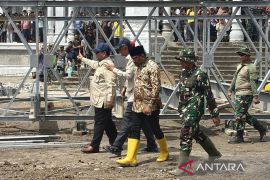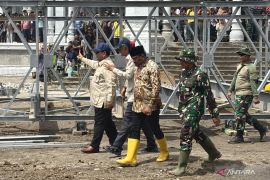"The only means to stop this cycle of violence is for Israel to place human rights at the center of its policy-making," Makarim Wibisono, the UN special rapporteur on the situation of human rights in the Palestinian territories, said.United Nations, Nov. 26 (Antara/Xinhua-OANA) - The Israeli governments use of house demolition as a punitive measure in response to alleged acts of violence by Palestinians must end immediately, and the practice, which targets Palestinian homes in both Israel and the Occupied Palestinian Territory, is a violation of human rights law, two UN experts said on Tuesday.
"All acts of violence require a firm response from the Israeli authorities, and those responsible should be tried before a court of law and sentenced for their crimes," Makarim Wibisono, the special rapporteur on the situation of human rights in the Palestinian territories, said in a press release.
However, the State "cannot go beyond what is sanctioned by international law," he added.
Wibisonos remarks came after the Nov. 19 demolition of the East Jerusalem home of Abd al-Rahman al-Shaludi, the Palestinian man accused of committing last months car attack in Jerusalem that claimed the lives of a 22-year-old woman and a three-month- old child.
In addition to Al-Shaludis home, the Israeli authorities have slated at least six other homes of Palestinian suspects located in East Jerusalem, Askar refugee camp, and Hebron, for demolition or sealing -- the practice of completely or partially closing off the rooms of a home with concrete or metal sheeting, prohibiting family members from accessing their homes, at times indefinitely.
Meanwhile, following a recent deadly attack against a Jerusalem synagogue, a number of other house demolitions are reportedly being prepared.
"In the case of Mr. Al-Shaludi, who was shot and killed by Israeli police at the scene of the attack, the demolition of his home in the middle of the night served no other purpose than to punish his innocent parents and five siblings, rendering them homeless," Leilani Farha, the special rapporteur on the right to adequate housing, said.
"Simply put: the use of house demolition as a punitive measure is a form of collective punishment contrary to international law," she said. "Israel must immediately end its use of this devastating practice."
The recent house demolitions come within a context of increasing tensions -- marked by a number of fatal incidents -- between Palestinians and Israelis.
However, the two special rapporteurs warned that an upsurge in demolitions would "only add to the frustration and despair felt by the people living under prolonged military occupation, and sow the seeds of more hatred and violence for the future."
"The only means to stop this cycle of violence is for Israel to place human rights at the center of its policy-making," Wibisono said.
On Nov. 10, Israeli Prime Minister Benjamin Netanyahu instructed security officials to demolish the homes of Palestinians who perpetrated deadly attacks on Israelis, his office said in a statement. The order on the use of the controversial punitive measure was made during a security discussion with Israels defense leadership that was convened in Jerusalem after two stabbing attacks claimed the lives of two Israelis.
For many years, Israel used house demolitions as punitive measure against relatives of Palestinians who harmed or allegedly harmed Israelis. Since the occupation of the Palestinian West Bank and Gaza in 1967, Israeli security forces had demolished hundreds of homes.
However, in 2005, the Israeli military abandoned this policy, after the security establishment had found that the policys drawbacks outweigh its benefits. The punitive measure was brought back to use by the government in July, after the abduction and murder of three Israeli teenagers in the West Bank.
(U.C003)
Editor: Fardah Assegaf
Copyright © ANTARA 2014










